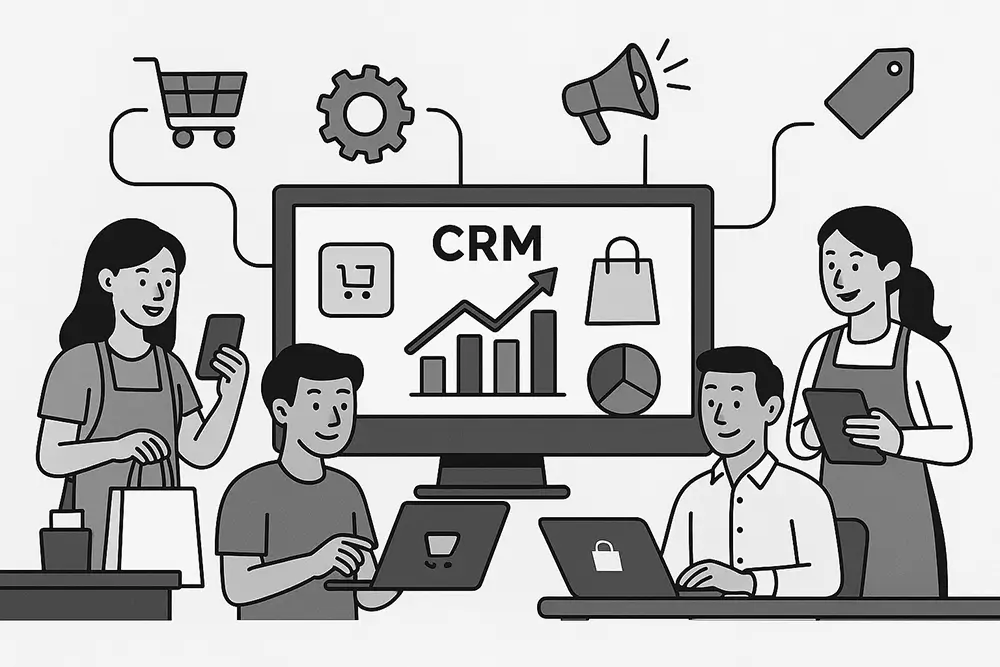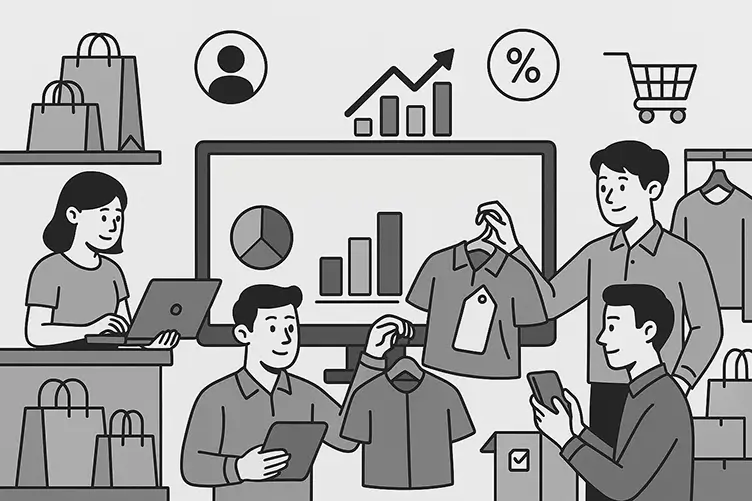Comprehensive E-commerce CRM Solutions
CRM for retail provides an Integration feature, especially for E-commerce CRM solutions that integrate different platforms required to run an e-commerce business. This helps customers purchase, sell, and connect with the customer support team easily. CRM software provides real-time tracking, allowing businesses to track every sale, manage inventory, and measure user performance.
If a business provides the best services and support, they gain customer loyalty—customers won't try other business services. CRM for retail provides many advanced features such as automation, personalized marketing, effective lead management, WhatsApp marketing, automatic alerts, and notifications. These features help e-commerce businesses increase sales and enhance customer support and user performance.
Advantages of CRM Software
in Retail and E-Commerce
Omni-Channel Support
E-commerce CRM Solutions supports an integration feature that integrates all possible communication channels such as mobile, social media, and web where customers can connect with the support team and services onto a unified platform.
Personalized Interactions
CRM for retail software provides a centralized database to store customer data, purchase history, buying patterns, and preferences so users can interact personally and send special offers to promote your business.
Automated Campaigns
Provides an automation feature for personalized marketing, automatic notifications and alerts regarding special offers, new arrivals, and paid campaigns on social media. Automation saves time for complex tasks.
Lead Management
E-commerce CRM Solutions software helps capture leads from different platforms and manage and follow those leads effectively, ensuring that your users never miss any leads.
Loyalty Programs
CRM for retail supports different loyalty programs organized for customers who buy things repeatedly. Businesses do this to build healthy and long-term relationships.
Analytics and Reporting
This feature helps businesses understand current market trends by providing deep details about customer preferences, buying patterns, and purchase history for better marketing strategies.
Proactive Service
CRM for retail provides tools and techniques that help identify customer satisfaction levels, resolve customer issues, and address concerns to ensure no one quits your services.
Order Tracking
This feature helps track the status of orders, provides real-time updates, and notifies both user and sender when there is any delay in order delivery, integrated with inventory management.
Centralized Information
Groweon CRM provides a centralized database to store personal customer data and activity, allowing users to retrieve data easily with real-time updates so every user has current information.
Flexible Integration
Having CRM for retail can integrate required software easily within CRM software, which helps facilitate different services to customers and establish long-term relationships.
Secure Data Storage
Retail CRM Software provides top-notch security, end-to-end encryption, and ensures that personal customer data never leaks. No one can breach your data.
Inventory Insights
This feature helps provide information about stocks, helps avoid stockout conditions, and helps understand the buying patterns of customers.
Customizable Solutions
Retail CRM Software provides a customization feature that helps businesses customize forms according to their business needs and facilitates the scalability of resources.
Task Management
Assign tasks automatically based on pre-defined business criteria. Whenever a lead or query comes, CRM assigns tasks to suitable users.
Retail CRM Software
Retail CRM Software is a tool that helps retail businesses manage and improve their interactions with customers. It acts like a digital assistant, keeping track of customer details such as contact information, purchase history, and preferences. This information allows retailers to understand their customers better and offer more personalized service.
The software helps build stronger customer relationships by remembering important details, which enables businesses to make personalized recommendations or send special offers. It also enhances marketing efforts by allowing retailers to create targeted campaigns, such as sending discounts on products that certain customers are interested in, which increases sales chances.
Retail CRM Software improves the sales process by organizing leads and tracking sales opportunities, ensuring that no potential customer is overlooked and follow-ups are done on time. It also supports customer service by storing past interactions, helping the support team provide quicker and more accurate assistance.

Key Features of Groweon CRM
Lead Management
Harnessing all leads from different platforms onto a unified platform ensures that no leads will be missed. Having all the leads you can manage your leads effectively, increases your conversion rates.
Customer Relationship Management
Having all the details about customers, their preferences, purchase history, and their behavior helps to build a strong relationship with customers. And you can provide personalized services to individuals.
Sales Automation
Smoothly manage the process of sales. Retail CRM Software helps to track every customer and manage the performance of salespersons. Provides automatic follow-up so that no customer misses.
Order Management
Retail CRM Software helps to manage each order, tracking orders, on-time delivery of products, provides real-time updates if there is any delay, informs buyers on time, manages whole details of customers, helps to improve customer experience.
Inventory Management
This feature of Retail CRM Software helps to manage inventory, effectively manage stocks through real-time updates, and helps to avoid out-stock conditions.
Service Ticket Management
CRM software provides the feature of service ticket management. This feature helps the user to raise tickets regarding any issues of customers. This helps to provide better customer support.
Customizable Forms
This feature helps businesses collect customer information through forms. Retail CRM Software provides customizable forms so companies can create and deploy them accordingly.
Reporting and Analytics
This feature of Retail CRM Software helps to analyze the market and helps to understand market trends so that they can improve their business strategy and decision-making.
Marketing Automation
CRM provides tools and techniques to execute better marketing campaigns. Provides marketing tools such as email, SMS, WhatsApp, and other social media platforms.
Mobile Access
CRM provides the facility of mobile access. Users can access useful information about business so that you can give responses to every customer.
API Integration
CRM software facilitates integration features. This helps to integrate required software within Retail CRM Software. So that you can streamline business operations from a single platform.
AMC/Warranty Management
This is used for managing the annual maintenance of any services or product. It helps to improve customer experience and satisfaction regarding products and services.
Frequently Asked Questions
CRM software helps businesses to manage seamless workflow, and CRM helps to store customer data and other useful information. Advanced CRM software provides Efficient lead management features, inventory management, automatic alerts and notifications, service ticket management, etc.
Yes, CRM software provides a single view of the customer by centralized customer data and all other information. Having CRM software you will get benefits like Data Integration, Comprehensive Customer Profiles, Real-Time Updates, Cross-Departmental Access, and 360-degree Views.
E-commerce CRM Solutions can personalize the shopping experience by providing real-time engagement, Tailored Product Recommendations, Personalized Customer Service, Customized Loyalty Programs, Personalized Shopping Journeys, and Anticipating Customer Needs.
CRM for retail helps to enhance customer onboarding in retail and online by facilitating Personalized Welcome Communications, Centralized Customer Data, Streamlined Data Collection, Enhanced Customer Segmentation, Improved Customer Support, and Feedback Collection.
CRM for retail software provides Customer Profiles, Customer Interactions, Marketing Effectiveness, Inventory Management, and customer support. For e-commerce, E-commerce CRM Solutions provides Customer Profiles, Sales Analytics, Website Interaction, Customer Support, Personalization, and Revenue Metrics.
Yes, E-commerce CRM Solutions provides features such as Automated Cart Recovery Emails, Personalized Offers and Discounts, Customer Segmentation, Retargeting Campaigns, Integration with E-Commerce Platforms, and Customer Feedback Collection that help in recovering abandoned shopping carts at online stores.
CRM software provides different features that help to manage inventory. Having CRM for retail we will get benefits like Integration with Inventory Systems, Sales and Purchase Data Insights, Customer Demand Forecasting, Personalized Marketing and Promotions, Customer Feedback and Insights, and Enhanced Customer Service.
Here are some benefits of CRM for retail such as Personalized Customer Engagement, Enhanced Customer Retention, Comprehensive Customer Data, Improved Customer Insights, Enhanced Customer Experience, and Effective Campaign Management.
CRM software for other industries
- CRM for Automobile
- CRM for Lab Instruments & Supplies
- CRM for Furniture & Supplies
- CRM for Metals, Alloys & Minerals
- CRM for Plants, Machinery & Tools
- CRM for Building & Construction
- CRM for Apparel & Textile
- CRM for Electronics & Electrical
- CRM for Packaging Machines & Goods
- CRM for Chemicals, Dyes & Solvents
- CRM for Cosmetics, Jeweller & Handicrafts
- Real Estate Services
- Education and Training
- Hospitality & Tourism
- Digital Marketing
- Insurance & Loan Companies
- Retail and E-commerce
- Healthcare Services

